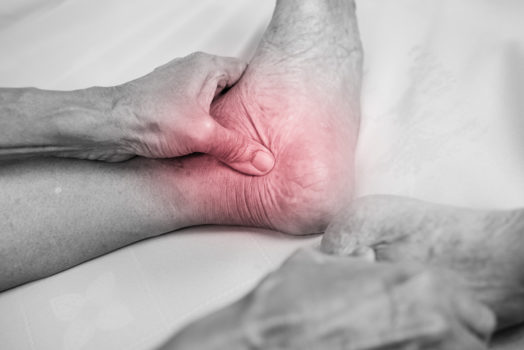How to Care for a Loved One’s Feet – Keeping Toes in Check

Feet are the foundation for movement. When your loved one’s feet hurt it compromises many other activities. Foot care is super important to keep on top of. Feet are often neglected and get little attention till there is a raging issue. Elderly foot care is important to your loved one’s health.
Follow these foot care best practices for happy feet!
Take Time to Look at Feet
This may sound obvious but consider where feet spend most of their time: in socks or shoes, undercovers, or at the far end of your visual field. Rarely do you get close and personal with feet. As people age it becomes more and more difficult to reach toes and see changes in foot health. Your loved one may feel foot issues but conditions like neuropathy interfere with regular sensation processing. Neuropathy affects peripheral nerves and is more common in people with diabetes. It can cause numbness and weakness in feet making it hard to sense other emerging issues.
This is why it is important to give feet regular close inspection. But, what are you looking for? Common red flags in elderly foot care include:
Discoloration
Burning pain
Open sores
Noticable changes
If your loved one exhibits any of these signs, you may want to seek medical attention.
Work with a Podiatrist
Podiatrists work on feet and lower limbs. They specialize in preventing and diagnosing foot issues and are experts in elderly foot care. Podiatrists work to correct feet deformities and are skilled at keeping people mobile, relieving pain, and managing infections.
They often treat a range of conditions including:
Foot and toenail fungus
Calluses and corns
Bunions
Injuries
Open sores and blisters
Pain
Deformity
Podiatry care is covered by medicare. Most podiatrist see patients in medical offices but a few offer mobile services and will come directly to your loved one’s home. If your loved one has any foot concerns a podiatrist is a person to add to your team.
Practice Great Foot Hygiene
Prevention is key when it comes to good elderly foot care. Wash your loved one’s feet with mild soap and make sure to thoroughly dry them. Keep feet moisturized. Cracked dry skin may feel uncomfortable and might contribute to infections.
Keep your loved one’s toenails trimmed. Cut toenails straight across and do not round the corners. This helps keep toenails from growing into the sides of the toe causing ingrown toenails. Podiatrists help with toenail care and nail salons also often provide elderly foot care.
Encourage your loved one to keep feet elevated while at rest. Elevating feet supports good circulation. Be aware of other medical forces like diabetes. People who have diabetes are susceptible to gangrene if feet do not receive regular care.
Check to make sure shoes fit properly. As feet swell and change shoes may not fit the same. Poorly fitting shoes can cut off circulation and cramp toes. Cramped toes can lead to ingrown toenails and infection.
Wrap Up
Foot hygiene is an important part of personal care. Ensuring the foot health of your loved one means regularly checking feet for changes, redness, and swelling, open sores, and discomfort. Your attention to your loved one’s foot health helps prevent issues with mobility, infection, and illness.
